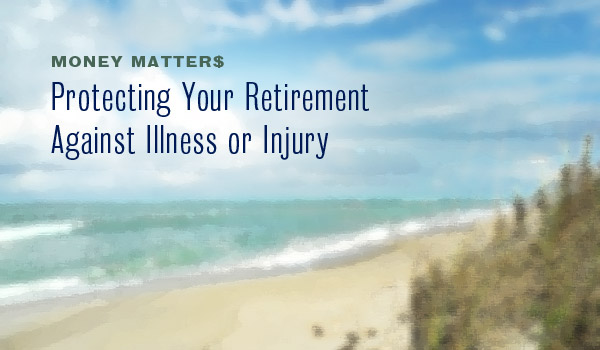Money Matters: Protecting Your Retirement Against Illness or Injury
Cary, NC – If you’ve already started saving for your retirement, congratulations. You’re on your way to fulfilling lifelong dreams and goals. There are millions of Americans who suffer a disabling illness or injury and, as a result, cannot work. Such afflictions not only effects their physical well being, but their fiscal health as well, damaging their income and retirement funds.
Disruptions
Being too sick or hurt to work could disrupt your retirement savings in many ways:
- Contributions to Social Security would stop.
- Contributions to your employer-sponsored retirement savings plan, such as a 401(k), would also stop, as would any employer matching contributions.
- If you lose your job, you will no longer accrue additional pension benefits, if available.
A Solution for Protecting Your Ability to Save for Retirement
Fortunately, several insurance carriers offer individual disability income insurance programs that can help you continue saving for retirement. These types of programs are ideal for those who are serious about saving for retirement and have maxed out their personal disability income insurance benefits.
Upon a qualifying disability, this type of program pays monthly benefits directly to a trust to help you continue saving for retirement. This trust then invests the benefits based on your risk tolerance. At a set age (varies by program, but typically age 65 or 67), you start receiving income payments from the trust. These payments would continue until death or until the funds diminished.
4 Things to Look For
When shopping for this type of offering, you should look for:
- A carrier that does not require you to validate your current retirement savings efforts
- Non-cancelable, guaranteed renewable coverage – this means the carrier cannot cancel your policy except for failure to pay premiums, and you lock in a premium rate when you purchase the policy.
- Benefit periods that coincide with retirement ages (such as age 65 or 67)
- An offering that allows you to decide how to invest your benefits, based on your risk tolerance
Overall, look for an insurance company that is financially strong and has a track record of exceptional customer service and claims handling. If the unthinkable does happen, you’ll appreciate the quality service when you need it the most.
———————————————————————————————-
Story by Raj Satsangi, Principal Financial Group. Read more Money Matters. Send him your questions via email. Photo by Daniel Piraino.



